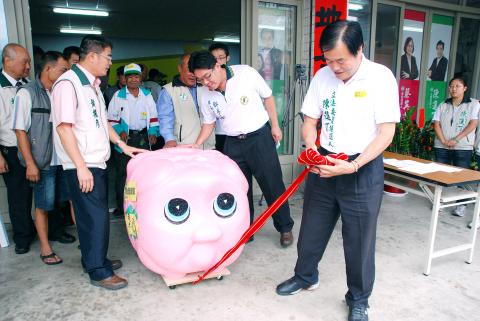A new “Rural Renaissance” movement, which symbolizes the awaking of Taiwanese to a new life philosophy, has been taking shape and the government should take a leading role in making the renaissance happen, Democratic Progressive Party (DPP) Chairperson Tsai Ing-wen (蔡英文) said yesterday.
More people have decided to move away from the cities, either returning to their rural hometown or choosing to live in the countryside, the DPP’s presidential candidate said at campaign stop in the remote township of Nanjhuang (南庄), Miaoli County.
“These people work in all professions — farmers, artists, computer programmers, coffee shop owners, writers — and bring different dimensions that will be able to change the dynamics of development in Taiwan’s rural areas, which is why I called it a ‘Rural Renaissance,’” she said.

Photo: CNA
The “dream chasers” were far more intelligent than the government, she said, because they started to develop land and areas that had been “abandoned and forgotten” by the government and turned them into creative businesses or relaxing getaway sites.
If she were elected president, her administration would keep the Rural Renaissance alive and flourishing, Tsai said.
The government should launch a rural land reform that includes three elements — a complete review of land use across the nation, a comprehensive plan for national rural land use and a proactive effort to help people resolve current controversial land use cases.
Speaking at a coffee shop established by a career woman who returned to Nanjhuang after spending many years in Taipei, Tsai said “a new wave of awakening of humanity was taking shape in many of the places I have visited — Meinung (美濃) in Greater Kaohsiung, Sinshe (新社) in Greater Taichung and the northeastern coast — on my campaign trips.”
What these people have been working on would enrich the local culture and traditions as well as boosting local economy, she said, and the government should relax outdated regulations to “let them blossom, and not get in their way.”
One key problem confronting the government is that it has placed strict limitations on the use of “non-urban lands,” but has only divided land into two types — urban and non-urban, she said.
A successful land reform effort would benefit agricultural development and boost local economies at the same time, Tsai said, noting that those are two areas her presidential platform has emphasized.
During an earlier visit to Dahu (大湖) in Miaoli County, which is known for its strawberry crops, Tsai reiterated that focusing on the local economy was the right direction for Taiwan because developing local economies would increase job opportunities and incomes.
Tsai, who aims to establish a “new agriculture” based on precision and technology, proposed the establishment of a NT$100 billion (US$3.32 billion) agricultural development fund, a tracking system for all agricultural products and a marketplace platform to ensure fair prices for agricultural products.
Her agricultural policy also focuses on the domestic market by encouraging “local production and local consumption.”
Tsai is scheduled to conclude her four-day trip to Hakka areas in Miaoli, Hsinchu and Taiyuan today.

An essay competition jointly organized by a local writing society and a publisher affiliated with the Chinese Communist Party (CCP) might have contravened the Act Governing Relations Between the People of the Taiwan Area and the Mainland Area (臺灣地區與大陸地區人民關係條例), the Mainland Affairs Council (MAC) said on Thursday. “In this case, the partner organization is clearly an agency under the CCP’s Fujian Provincial Committee,” MAC Deputy Minister and spokesperson Liang Wen-chieh (梁文傑) said at a news briefing in Taipei. “It also involves bringing Taiwanese students to China with all-expenses-paid arrangements to attend award ceremonies and camps,” Liang said. Those two “characteristics” are typically sufficient

A magnitude 5.9 earthquake that struck about 33km off the coast of Hualien City was the "main shock" in a series of quakes in the area, with aftershocks expected over the next three days, the Central Weather Administration (CWA) said yesterday. Prior to the magnitude 5.9 quake shaking most of Taiwan at 6:53pm yesterday, six other earthquakes stronger than a magnitude of 4, starting with a magnitude 5.5 quake at 6:09pm, occurred in the area. CWA Seismological Center Director Wu Chien-fu (吳健富) confirmed that the quakes were all part of the same series and that the magnitude 5.5 temblor was

The brilliant blue waters, thick foliage and bucolic atmosphere on this seemingly idyllic archipelago deep in the Pacific Ocean belie the key role it now plays in a titanic geopolitical struggle. Palau is again on the front line as China, and the US and its allies prepare their forces in an intensifying contest for control over the Asia-Pacific region. The democratic nation of just 17,000 people hosts US-controlled airstrips and soon-to-be-completed radar installations that the US military describes as “critical” to monitoring vast swathes of water and airspace. It is also a key piece of the second island chain, a string of

The Central Weather Administration has issued a heat alert for southeastern Taiwan, warning of temperatures as high as 36°C today, while alerting some coastal areas of strong winds later in the day. Kaohsiung’s Neimen District (內門) and Pingtung County’s Neipu Township (內埔) are under an orange heat alert, which warns of temperatures as high as 36°C for three consecutive days, the CWA said, citing southwest winds. The heat would also extend to Tainan’s Nansi (楠西) and Yujing (玉井) districts, as well as Pingtung’s Gaoshu (高樹), Yanpu (鹽埔) and Majia (瑪家) townships, it said, forecasting highs of up to 36°C in those areas